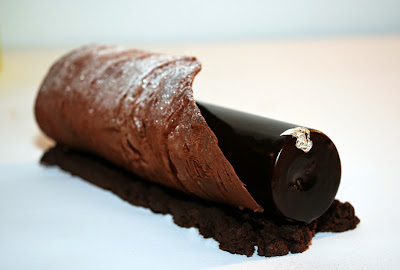James Baldwin's first years in France were filled with adventure, tribulation, merriment, and hardship. He describes what may have been the greatest transformational event during this time in his essay "Equal in Paris":
On the nineteenth of December, in 1949, when I had been living in Paris for a little over a year, I was arrested as a receiver of stolen goods and spent eight days in prison...
After having been hospitalized in Aix en Provence, Baldwin returned to Paris and moved into the Grand Hôtel du Bac on rue du Bac in the 7th
arrondissement. (The exact address of this hotel is unknown.)
Rue du Bac, Paris
Britchi Mirela
Creative Commons Attribution-Share Alike License
An American acquaintance moved into the hotel as well, bringing with him a bed sheet from the Hôtel des Deux Arbres, where he had previously lodged. He gave the sheet to Baldwin, who had been having difficulty in obtaining clean sheets from the staff at the Grand Hôtel du Bac. Baldwin promptly placed the sheet on his bed.
On the evening of December 19, feeling lonely and depressed, he went to his friend's room. He found two policemen there. They politely asked if they could see his room and he accompanied them there without fear or concern. It was only when one of the agents approached the bed and reached for the bedspread that Baldwin realized what was happening:
Sadly, and without a word to me, the inspector took the sheet from the bed, folded it under his arm, and we started back downstairs. I understood that I was under arrest.
The policemen accompanied Baldwin and his friend to the police station and placed them in a cell, where they stayed overnight. The next day they went to the Préfecture de Police on Ile de la Cité, where they were fingerprinted, photographed, and placed in a holding "cell" that Baldwin described as a
great enclosed shed in which had been gathered the very scrapings off the Paris streets.
Later that day, he and his friend were led out of the Préfecture and into a police van that took them off to separate prisons. Baldwin went to Fresnes (located in a Paris suburb); his friend went to La Santé (located in Paris' 14th
arrondissement).
Suffice it to say that things went downhill from there.
Baldwin's first trial was scheduled for the day before Christmas Eve. He was brought back to Paris to stand before a judge at the Palais de Justice. He and his friend waited most of the day for their case to be called, only to have the trial postponed because there was no interpreter present. The new trial date was set for December 27.
Palais de Justice
© Discover Paris!
Thanks to the kindness of a prisoner who had been acquitted of the charges he faced, Baldwin was able to send word of his plight to the outside world. His contact, an American patent attorney for whom Baldwin had worked as an office boy, came to the prison on Christmas Eve and told Baldwin that he would send an attorney to defend Baldwin at his trial on the 27th. He would also send character witnesses to testify, and assured Baldwin that he would be one of them.
At the trial on December 27th, the case was dropped. Baldwin says that when the full story behind the incident was told, it
caused great merriment in the courtroom, whereupon my friend decided that the French were "great."
But Baldwin found the laughter in the room to be chilling.
When he returned to the Grand Hôtel du Bac, he was told that he needed to pay his hotel bill within the hour or leave the premises. Despairingly, he took one of the dirty bed sheets that had been the cause of the entire incident and used it to try to hang himself from a water pipe in his room.
The pipe gave way, spraying the room and Baldwin with water. At this, he began to laugh. He gathered his belongings and left the hotel, never to return to it again.
James Baldwin
1955 Carl Van Vechten
Baldwin wrote "Equal in Paris" in 1955. It was first published in a magazine called
Commentary. The information about his last visit to the Grand Hôtel du Bac was published in the biography
James Baldwin by David Leeming (Alfred A. Knopf, 1994).
************
If you like this posting, share it with your friends by using one of the social media links below!































